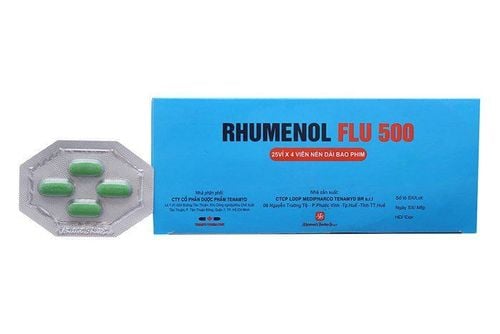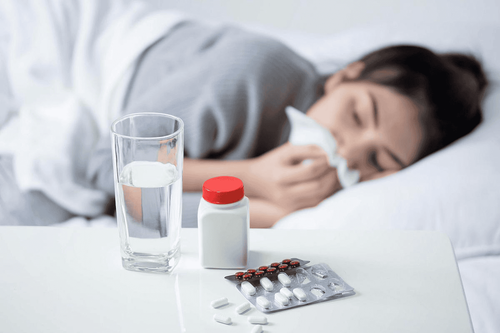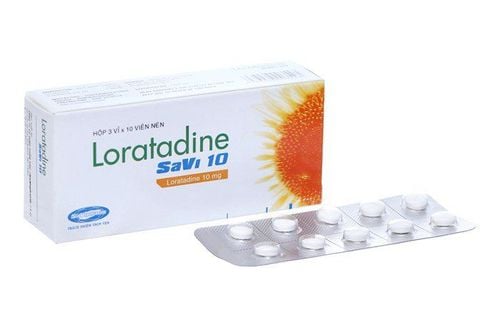This is an automatically translated article.
Gencontuss is a group of combination medicines used to treat symptoms caused by colds, allergies, hay fever, and certain other respiratory conditions. To reduce the risk of serious side effects, users need to carefully follow the directions for use.1. Indication of the drug Gencontuss
What is Gencontuss? Gencontuss is a combination medicine commonly indicated for the treatment of symptoms caused by the flu, common cold, allergies, hay fever, or other respiratory conditions (e.g., bronchitis, sinusitis). This combination medicine usually includes:Dextromethorphan is a cough suppressant by affecting a certain part of the brain (cough processing center) and reducing the sensation of coughing. Decongestants help to clear the nasal cavity and relieve symptoms of nasal congestion. Antihistamines relieve watery eyes, itchy eyes/nose/throat, runny nose, and sneezing. Currently, cold products have not been shown to be safe or effective in children under 6 years of age. Therefore, do not use this combination drug for the above subjects (unless specifically directed by a doctor).
Some long-acting tablets or capsules) are not recommended for use in children under 12 years of age, so consult your doctor before taking them.
In some cases, the combination Gencontuss medicine does not completely cure or shorten the cold as desired, and can even cause side effects if used incorrectly. To reduce the risk of serious side effects, users need to carefully follow dosage instructions. Also:
Do not use this medicine just to make a child drowsy. Do not combine cough medicine and other cold medicine containing the same ingredients. See other ways to relieve cough and cold symptoms (such as drinking enough fluids, using a humidifier, nasal drops, saline nasal spray).
2. Dosage and how to use Gencontuss
If you are taking an over-the-counter medication, read all directions on the package before taking it. Users should take Gencontuss with or without food with a full glass of water (about 240 ml) or as directed by their doctor. If the user is prone to stomach upset, Gencontuss can be taken with food or milk.How to use the forms of medicine in Gencontuss are as follows:
If you are using Gencontuss liquid, use a special measuring device or spoon to measure and take the correct amount of medicine and shake the bottle well before taking. If you are taking Gencontuss which includes multiple extended-release capsules, swallow them whole without crushing or chewing them to avoid the risk of side effects. Particularly for Gencontuss combined with chewable drugs, the drug should be chewed thoroughly before swallowing. If you are taking the powdered medication, mix it thoroughly with the appropriate amount of liquid and stir well. Drink the entire liquid immediately, do not preserve or store for later drinking. The dosage of Gencontuss is prescribed based on your age, medical condition, and response to treatment. If you are taking this medicine to treat signs of allergies or hay fever, take it exactly as directed to increase its effectiveness.
Improper use of Gencontuss (abuse) can lead to serious harm (eg, brain damage, seizures, death). Therefore, do not increase your dose, take it more often, or take it for a longer time than directed by your doctor. In addition, users should notify the doctor if your condition persists or tends to worsen.

Nếu sử dụng thuốc Gencontuss dạng lọng, hãy đo đúng liều thuốc
3. Undesirable effects when using the drug Gencontuss
Like many other medicines, Gencontuss can also bring some side effects such as: drowsiness, dizziness, headache, blurred vision, nausea, constipation, stomach upset or dry mouth, dry nose, dry throat. In addition, Gencontuss can also dry and thicken mucus in the lungs, making it harder to breathe and more difficult to clear the lungs. To help prevent these side effects, you can suck on hard candy (sugar-free) or shaved ice, chew gum (sugar-free) to relieve dry mouth, and drink lots of water to help clear your lungs.Tell your doctor right away if you experience serious reactions such as mental changes (e.g. confusion, hallucinations), ringing in the ears, ringing in the ears, difficulty urinating, weakness, easy bruising cyanosis, easy bleeding, irregular heartbeat, convulsions.
4. Be careful when using Gencontuss
Before taking the drug Gencontuss, users should note some of the following issues:If you are allergic to the ingredients of the drug or any other condition, notify your doctor immediately; Note and share with your doctor if you have certain medical history. Especially breathing problems (eg, emphysema and asthma), diabetes, certain eye problems (glaucoma), heart problems, high blood pressure, liver problems, kidney problems, seizures, stomach and intestinal problems (e.g., stomach ulcers, intestinal blockages), overactive thyroid (hyperthyroidism), urination problems (eg, urinary retention, difficulty urinating due to an enlarged prostate gland). Gencontuss may make you drowsy, so do not drive, operate machinery, or do anything that requires alertness until you can do it safely. It is best to limit alcoholic beverages. Gencontuss may contain aspartame. If you have phenylketonuria (PKU) or any condition that requires you to limit your absorption of Aspartame (or Phenylalanin) consult your doctor to use the medication in the safest way possible. Older people may be more sensitive to the side effects of the drug, especially dizziness, drowsiness, mood swings, constipation, heart palpitations, difficulty urinating, or blood changes pressure. Dizziness, drowsiness, and confusion may increase the risk of falls in the elderly. Children may also be more sensitive to the effects of antihistamines, in particular, they may be agitated, excited instead of sleepy. For women who are pregnant, Gencontuss should only be used when absolutely necessary. For women who are breastfeeding, Gencontuss may pass into breast milk, consult your doctor before taking it.

Hãy cân nhắc thật kỹ trước khi dùng thuốc Gencontuss nếu bạn đang mang thai
5. Gencontuss drug interactions
MAO inhibitors (such as Isocarboxazid, Methylene Blue, Moclobemide, Phenelzine, Procarbazine, Safinamide, Rasagiline, Selegiline or Tranylcypromine...) if taken with Gencontuss, can cause serious drug interactions, even death. . Most MAO inhibitors should not be used 2 weeks before and after treatment with Gencontuss.Some medications that may react with Gencontuss include: topical antihistamines (such as Diphenhydramine cream, ointment, spray), antispasmodics (eg, Atropine, Belladonna extract), blockers beta (eg, Metoprolol, Atenolol), Parkinson's disease medicine (such as Trihexyphenidyl), guanethidine, certain inhaled anesthetics (eg, Halothane), Methyldopa, Scopolamine, Rolapitant tricyclic antidepressants (eg, Halothane) eg: Amitriptyline, Desipramine).
Tell your doctor or pharmacist if you are taking other products that cause drowsiness such as opioid pain relievers or cough suppressants (such as Hydrocodone, Codeine), alcohol, marijuana, sleeping pills or anxiety medications (such as Alprazolam, Lorazepam, Zolpidem), a muscle relaxant (such as Carisoprodol, Cyclobenzaprine), or another antihistamine (such as Cetirizine, Diphenhydramine).
Some ingredients contained in medicines can affect the user's heart rate or blood pressure. Tell your pharmacist what medicines you are taking and ask how to use them safely (especially cough and cold medicines and diet aids).
Gencontuss may affect the results of certain tests (such as brain scans for signs of Parkinson's disease, urine drug screening tests). Make sure your doctor and laboratory staff know you are using this combination.
6. Some notes when using Gencontuss
If you use an overdose of Gencontuss and experience symptoms such as fainting or difficulty breathing, take the patient to the emergency room immediately. Some signs of overdose include: agitation, body hot flashes, hallucinations, confusion, large pupils, muscle twitching, convulsions. In children, euphoria may appear first and then there may be loss of coordination, drowsiness, loss of consciousness, convulsions. Do not take Gencontuss for a few days before an allergy test because it may affect the test results.If you forget to take a dose, you should take it as soon as you remember. If it is almost time for your next dose, skip the missed dose. Do not take a double dose to catch up with your treatment.
Store Gencontuss in a sealed container at room temperature (15-30 degrees Celsius), protected from light and moisture. Do not freeze the liquid form of the medicine and keep it out of the reach of children and the reach of pets.
Please dial HOTLINE for more information or register for an appointment HERE. Download MyVinmec app to make appointments faster and to manage your bookings easily.
Reference source: Webmd.com












